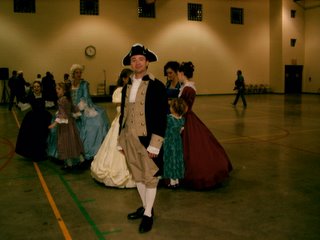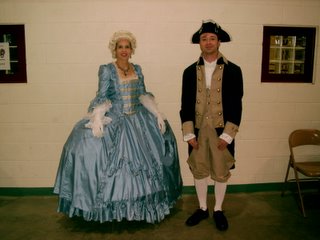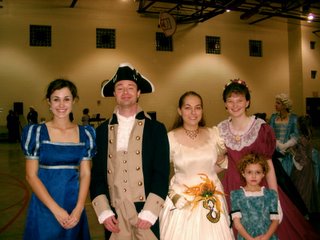 Oh no. Not now.
Oh no. Not now.My eyes locked on the barren patch of brown fabric where a gold button used to be. How did I not see that on the coat before I walked out of the costume shop? This beautiful brown and blue colonial outfit with the matching breeches, waistcoat and shirt now had a gap as obvious as a missing piece from a jigsaw puzzle, one high up near the collar where others would surely notice it.
I searched for the precious button all over the motel room floor. I dashed back out to the car and felt through the trunk. Dejected, I returned to the room. Sigh. Just another thing to worry about as I prepared for Her Majesty’s Royal Court Ball, an event in Mesa 100 miles away from home and 200 years in the past -- a night of 18th Century fashion, courtly manners, bows and curtsies, and lots of period dancing as organized by the Phoenix-area re-enactment organization “We Make History.”
In the shower I worked on a way to fit it into my character. The night before, an e-mail newsletter suggested we might all want to adopt a noble title. Knowing almost nothing of royal rank, I crammed information into my head from a furious Google search. I adopted the title of Viscount Francis -- below an Earl, above a Baron. I’d hashed out a backstory for my historical character: a nobleman who had returned to Europe after traveling in the colonies.
My chosen outfit would make me appear more soldier than gentleman, but I hadn’t worked out that discrepancy. I still had to figure out the button part… a-ha. I had traveled long and far by carriage, and because of delays in my transportation and the hurry to arrive in time for the festivities, a button fell loose and disappeared with no time for a fix. That wasn’t far from the truth: traffic outside Phoenix had mysteriously slowed to a crawl in some stretches.
But then came a miracle. The errant button had landed in the cuff of the coat, and it fell out as I slipped into costume. I dug out an emergency sewing kit from my travel bag and quickly re-attached it with a safety pin. The puzzle was solved!
Now came the first long walk of the night: from the motel room to the car in the full regalia, topped with my white-trimmed tricorn. I had parked as close as possible to the room to avoid awkward encounters, but I might still run into a few wide-eyed guests.
“Do not be alarmed if you see a man in colonial attire walking down the steps,” I advised the desk clerk upon check-in.
I made the walk quickly. Only one person spotted me: a man walking from the pool. But he slowed not a step. I saluted him. He saluted back.
My ride rolled up to the Fitch Center’s gym -- the ballroom for this occasion -- a quarter before six… fifteen minutes before the official arrival time. I sat in the car and peered through the open door, not wanting to walk in too early.
I got out after a few minutes of nervous anticipation.
This is it, I thought. No going back now. You said you couldn't have a do-over, but you could have a do-right.
* * *
Through four years of high school, I had a lot on my agenda: grades, getting into college, competing with the speech and debate team, and moving with my family from Kansas City to St. Louis between my junior and senior years.
Prom did not make the list. That landmark of the high school experience meant as much to me as a class ring at a time when I didn’t even wear a watch. Acquiring a date seemed an insurmountable task. I had learned to live without a girlfriend back in middle school, when puberty, cliques and open hostility towards nerds conspired to shove me into the outer circle.
I took the blame for that -- too out of touch, too nerdy, too smart, too shy. And although my friends on the debate team admired me, the desirable girls there were taken.
I couldn’t dance, either.
Maybe in another age, somebody would have insisted I learn the social graces of movement, but those days were gone. Even dancing at a couple of weddings in the family with some guidance from a relative felt awkward.
Square dancing in middle-school gym class filled me with dread. Girls hated me. They only joined their hands to mine because a teacher made them. Other boys would snicker at my unlucky partner, forced to cavort with some virus on legs.
By high school, the square dances ceased. But the damage was done, shadowing any thought of more frolicking in sets and figures. And here I had come, two decades later, to do exactly that same thing again.
* * *
“Greetings!” chimed Lord Scott in his light-blue colonial outfit as I entered through what I thought was the front door.
“Christopher Francis of Tucson,” I replied, slipping into my clipped British accent, removing my hat, and doing my best 18th Century bow before the master of ceremonies.
“So glad you could make it,” he welcomed and directed me to the front desk where I could check in.
 I spent the next hour acquainting myself with people who strolled in. A kind gentleman had nothing but encouragement for me upon hearing this was my first ball, advising me not to be shy in asking a lady for a dance. I met a couple and their son from Prescott, also newcomers, and mingled with a group involved in Arizona student government. Topping things off, the lady of honor for this ball, Her Majesty, gladly offered to pose with me for a picture (at left).
I spent the next hour acquainting myself with people who strolled in. A kind gentleman had nothing but encouragement for me upon hearing this was my first ball, advising me not to be shy in asking a lady for a dance. I met a couple and their son from Prescott, also newcomers, and mingled with a group involved in Arizona student government. Topping things off, the lady of honor for this ball, Her Majesty, gladly offered to pose with me for a picture (at left).“We don’t usually start slipping into character until 7:00,” Lord Scott advised. “But you may start early, if you wish.” I was already into my accent full throttle.
The musicians -- a piano player and a flutist -- tuned up as various people dressed from various points on the timeline strolled in. Eighteenth-century nobility in wigs and tricorns mixed with a Renaissance maiden or two. Fine ladies in floral ball gowns stood by musketeers. Revolutionary War patriot soldiers made it in, and fortunately for them, no redcoats were after them. A Spanish swordsman kept his weapon in check as a few characters from the Victorian era entered, along with some modern-day folks in tuxes. A Confederate Soldier emerged. So did a lone representative of WWII, and though neither were officially in the ball’s time frame, nobody minded. Children of all ages milled about the crowd, including the young princesses, eager to get started.
At 7:00, Lord Scott called us together for the Pledge of Allegiance and the National Anthem, a nod to the country whose heritage we were celebrating. And then the hands of time turned.
“Going back in time, one century, two centuries…”
Lord Scott introduced himself and Her Majesty, and the dancing began with an elegant promenade.
“Line yourselves up according to rank!”
Rank? Where does a viscount fit in this line? Nobody had told me any titles. People were forming in front of me. I had no partner. I couldn’t walk alone. In the nick of time, I spotted a young lady standing alone and bowed to her. She happily accepted my invitation.
We stepped hand in hand about the gym into various figures snaking about and around like a maze, ending in a full circle, but nothing fancy. My fears about colonial dancing evaporated.
Then the country dances began, the ones like square dances with the sets and figures and fancy moves led by a caller who would walk us through a dance slowly and then let us get to it.
The first dance, "Haste To The Wedding," seemed familiar. And as I went through the motions, I realized I’d done it before…
* * *
My education in English country dance began two years ago at Colonial Williamsburg with a simple guideline.
"If you can walk, you can dance," said the historical interpreter, dressed in period costume. "And if you move quickly, I can prove it to you.”
He lined us up in the ballroom of the Governor’s Palace midway through a tour. The rows of men and women faced each other. I stood near the end of my row, eyes trained on my camcorder’s viewfinder.
"A one couple, a two couple," he counted us off, his hands spread apart, marking the sets. "The evening starts and you all have been dancing forever, so you know what to do."
Our costumed guide explained to us that if somebody called out a dance we didn’t know, an explanation would kindly follow upon request.
"Oh it’s simple. Right hands across, left hands back, circle left, circle right, do-si-do, clap twice, two-hand turn your partner, turn to your neighbor, do-si-do, clap twice, start all over again. And you’re like, 'Is that all?' And you would do it."
And we were about to.
"Right hands across, which means across!"
I flicked off the camera and he led us through it, calling out the steps and humming in place of an orchestra. And unlike the square dances of my youth, I enjoyed it –- no vibes of animosity or hints of snickering.
I had wanted to try it earlier in the day, while watching a costumed group of women perform outside on a mild, sunny day. I didn’t get a chance, but I did learn my 18th Century honors: a bow over my strong leg, as coached to the audience by a Colonial Williamsburg dancing interpreter.
"It’s important for all of us to learn and practice our honors," she said.
* * *
The dances grew more complex, even with the help of a wonderful and patient caller. New steps were introduced and new figures thrown into the mix. I changed partners after every number, easily finding willing ladies.
Some dances deteriorated into confusion. “The Doubtful Shephard” threw us all through a loop with serpentine moves we couldn’t quite nail down after repeated attempts. We laughed it off, improvising simpler steps. No wonder that shepherd was doubtful.
Moments of levity worked their way in. At one point, the ladies cast one shoe into the middle of the floor as the gentlemen looked away. And then, on command, we scrambled for the footwear, grabbing the first shoe we could and searching out our Cinderella for a new partner.
That next dance, “Christchurch's Bells,” marked the high point: simpler figures done over and over again. All of us quickly mastered it and soon the caller stopped calling, leaving us to enjoy the piano and flute and prance merrily about one another, having the moves down by heart, just as it was in colonial times.
"Now you're dancing!" the caller exclaimed.
In those joyous moments, as I skipped among the dancers, the notion I was in a gym fell away. No basketball nets, no lines on the floor, no fluorescent lights, no PA system. I might have been dancing in 1700’s Williamsburg or London or Paris. I threw a few flourishing moves in -- a twirl here and there.
Although my heart wanted more, my lungs wanted a break, and my costume didn’t allow much ventilation. When the dance concluded, sweat trickled down my forehead. I only sat out one number while some gracious ladies lent me their fans as they spotted me cooling down.
Several breaks with an offering of punch and cookies gave us more time to relax and mingle. I managed to stay in my British accent through every conversation I had. Speaking was the easy part. Finding stylish and elevated words befitting a nobleman required much brainpower.
I forgot all about my self-appointed title of Viscount. I was simply “Mr. Francis,” to His Lordship and all others. I found it more than fitting. I had trouble imagining myself as both noble and newcomer whilst surrounded by many other newcomers, all learning steps more than two centuries old, all eager to smile through our mistakes.
“At this point, the spirit of the dance is more important than the steps of the dance,” I said to comfort a lady who felt a tad embarrassed at the mistakes she had made.
Not one lady refused me for a dance when I sought one out.
Not one.
Not one even used the perfectly acceptable excuse of sitting a dance out. I honestly felt they enjoyed my partnership, and I was quick to bow to each one of them after every dance with words of compliment:
 “Thank you for a most enjoyable dance.”
“Thank you for a most enjoyable dance.”“You are a wonderful dancer!”
“Your enthusiasm is most kind!”
They would smile and graciously return the honors.
Her Majesty’s Royal Court Ball ended just as it should have, with a slow waltz with “your favorite partner.” I again sought out a lone lady.
“I have to warn you,” I advised, “you may have to lead me a little.”
It turned out we were both a little fuzzy on the steps. But it didn’t matter. We waltzed around the floor as best we could, enjoying each others conversation and company, myself admiring her exquisite purple ball gown and doing my best not to step on it.
I once again thanked Lord Scott before I left, and he returned it with more gratitude for my long trip from Tucson.
“Was the evening everything you anticipated?”
“Much more,” I replied.
Five hours after I had slipped into the 18th Century, the moment had come to return to my “own place and time.” With more goodbyes to newfound friends, I walked back to my car and made the drive back to the hotel in silence, reflecting upon the evening and its significance in my life so far. I felt like a better person, someone more well-mannered and wiser, and I didn't want to let go of it.
I had taken the next step, gone beyond dressing for Halloween as a Patriot. A lot of people could willingly play Rebels and Redcoats. But could they pull off “Strip The Willow?”
In the late hour, I didn’t run into anybody else between the car door and my room door. I slipped out of my colonial attire and began sewing up the button temporarily secured by the safety pin. The needle didn’t want to go where I needed, and I had to settle for a couple of loose stitches. I bagged everything up as instructed by the costume shop and took one more look.
Oh no.
Shouldn’t there be another button on that coat pocket?
* * *
The afterglow of the evening hindered my sleep. Joy still flowed through every part of me, hours after the fact. The piano and flute echoed through my head. I tossed and flopped on the loose sheets of the motel room bed. At least it was my own. At a colonial inn, I probably would have ended up sharing a bed with somebody, having paid for a discount room.
Seven A.M. came and I rousted myself after a restless night. I dressed quickly, checked out, and made the two-hour drive back to Tucson on the power of two glasses of orange juice. My own bed in my own time stood waiting, a place to crash and find true rest.
My feet ached to be left alone. My right calf throbbed, forcing me to limp for two days afterward. It must have been that jig we did. But next time, my legs will be stronger.
And there will be a next time. George Washington's Birthday Ball is just weeks away.

2 comments:
Sounds like a wonderful evening, putting my proms to shame. -Michael
Chris Frances, I thought that was a wonderful story! I truly enjoyed reading it! I am so sorry that you were not able to go to your high school prom... but you must know that there are many of us out there who also experienced nightmare prom stories even though we did attend our proms! I am so happy that you have found something that truly makes you happy and that you enjoy so much and if only others could be as genuine as you!
Faye
Post a Comment